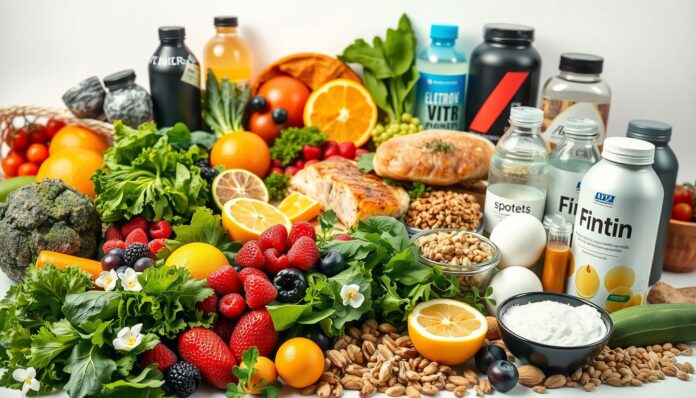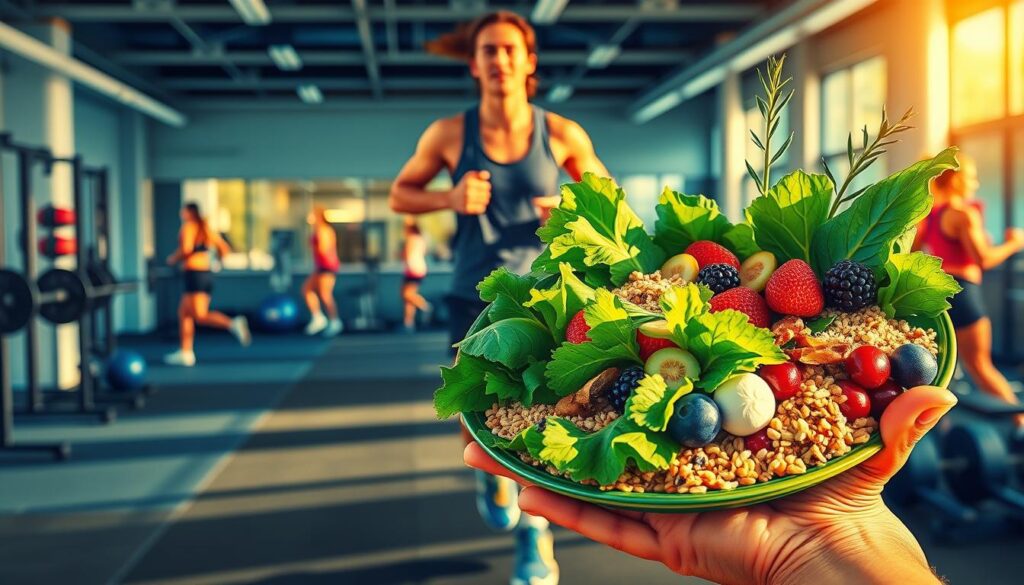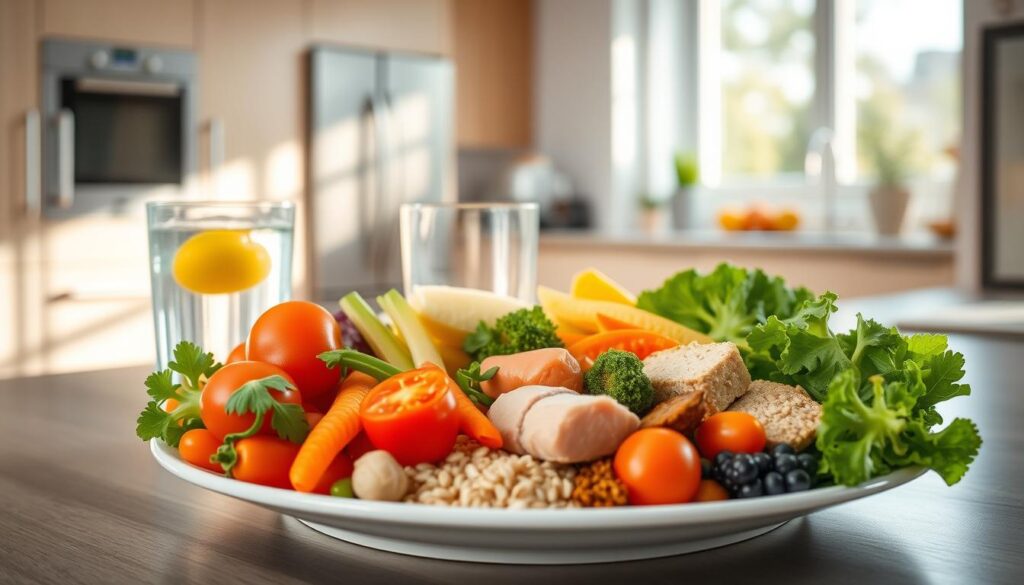Imagine gearing up for an important race, feeling the adrenaline surge through your veins. You’ve trained hard, but you realize nutrition’s key role in your performance. It’s not just about gym hours; it’s also about your diet. Proper nutrition boosts physical abilities, aids recovery, and keeps energy up during workouts.
By learning to eat for better performance, you can change your routine and reach your full athletic capacity. The right nutrition tips can help you push your limits and meet your goals.
Key Takeaways
- Nutrition significantly impacts athletic performance and recovery.
- A balanced diet fuels your body and boosts overall energy levels.
- Hydration is essential for optimal performance.
- Strategic meal timing enhances workouts and recovery.
- Knowing what to eat before, during, and after exercises is key.
- Cost-effective nutrition choices can support fitness goals.
- Including performance-enhancing foods can lead to better results.
Understanding the Role of Nutrition in Performance
Your diet is key to better athletic performance. A balanced diet gives athletes the fuel they need for training and recovery. Good athletic nutrition boosts energy, strength, and endurance. It also helps prevent injuries and aids in quick recovery.
The Importance of a Well-Balanced Diet
A balanced diet includes carbs, proteins, healthy fats, and vitamins. Carbs are the main energy source for workouts. Proteins help repair and grow muscles. Healthy fats are important for hormone balance and nutrient absorption.
The recommended calorie mix is 40-45% carbs, 15% protein, and 35-45% fat. This mix boosts energy levels during activities.
How Nutrition Affects Athletic Ability
Good nutrition boosts athletic ability. Eating enough protein increases your metabolic rate, which is key for performance. Drinking enough water also boosts metabolic function, giving a temporary performance boost.
Regular exercise and a good nutrition plan improve metabolic health. Adding superfoods like quinoa and beans can enhance health and performance. For more on nutrition for metabolism, check out boosting metabolism with nutrition.
Quality sleep and stress management also impact metabolism. Aim for 7-9 hours of sleep for best performance. Mindfulness helps manage stress. Better nutrition means better training, focus, and performance as an athlete.
Eating for Better Performance
A good diet is key to improving your physical performance. It’s important to eat a balanced mix of macronutrients. This supports your energy, muscle repair, and endurance.
Getting the right balance of carbs, proteins, and fats is essential. It helps you meet the needs of your activities effectively.
Integrating a Balanced Intake of Macronutrients
To create a diet for top performance, eat a variety of foods. Carbs are your main energy source, fueling both hard training and recovery. Proteins help rebuild tissues and support muscle growth. Fats give you long-lasting energy.
Each nutrient plays a unique role in your performance. So, it’s important to eat a balanced mix every day.
Benefits of Timing Your Meals
When you eat can greatly affect your body’s response to exercise. Eating at the right times gives you energy when you need it most. For example, carbs before and after workouts boost endurance and recovery.
Proper meal timing ensures you have the right nutrients for peak performance. This lets you train harder and recover quicker. By matching your meals to your workout schedule, you can reach your athletic goals better.
The Power of Carbohydrates in Fueling Exercise
Carbohydrates are the main energy source for our bodies, more so when we’re active. Knowing the different types can boost your performance and energy. There are complex and simple carbohydrates, each affecting energy differently during exercise. Choosing the right carbs is key to getting the most out of your workouts.
Types of Carbohydrates and Their Impact
It’s important to understand how different carbs affect your performance:
- Complex Carbohydrates: Found in whole grains, legumes, and veggies. They give energy slowly, perfect for long activities.
- Simple Carbohydrates: In sugars and refined foods, they give quick energy. Great for short, intense efforts.
Complex vs. Simple Carbohydrates
Knowing the difference between complex and simple carbs is vital for your diet:
| Carbohydrate Type | Energy Release | Common Sources |
|---|---|---|
| Complex Carbohydrates | Sustained Energy | Whole grains, vegetables, legumes |
| Simple Carbohydrates | Quick Energy | Fruits, honey, refined sugars |
To perform best, eat complex carbs before exercising. They keep your energy up and help you last longer in workouts. Finding the right mix of complex and simple carbs will greatly improve your exercise routine.
The Significance of Hydration
For athletes, staying hydrated is key to top performance. When you work out hard, your body loses water through sweat. Knowing this helps you stay hydrated.
Fluid Loss and Its Effects on Performance
Fluid loss can really affect how well you do. Dehydration makes you tired and lowers your endurance. It also hurts your ability to make quick decisions, which is important in sports. Drinking enough water helps avoid these problems.
Hydration Guidelines for Athletes
To stay hydrated in sports, follow some rules. Drink 2 to 3 cups of water a few hours before you start. During your workout, have 6 to 12 ounces of water every 15 to 20 minutes. After, drink water to replace what you lost.
| Activity Phase | Recommended Water Intake |
|---|---|
| Before Exercise | 2 to 3 cups (16 to 24 ounces) |
| During Exercise | 6 to 12 ounces every 15 to 20 minutes |
| After Exercise | Replenish lost fluids (consider body weight loss) |
Following these hydration tips helps you stay in top shape. It boosts your endurance and improves your sports performance. Remember, staying hydrated is as important as your diet and training.
Pre-Workout Nutrition Strategies
Choosing the right foods before exercise is key to your performance. Good pre-workout nutrition boosts your energy and workout results. Focus on carbs and light proteins for the right fuel without feeling weighed down.
What to Eat Before Exercising
Before your workout, pick foods that are easy to digest but give lasting energy. Good choices include:
- Whole-grain toast with nut butter
- Greek yogurt with fruit
- Oatmeal with honey and berries
- Light smoothies, blended with spinach, banana, and protein powder
These foods give you the nutrients and carbs you need. They prepare your body for your workout.
Timing Your Pre-Workout Intake
Knowing when to eat before exercise is key for top performance. Eat a big meal 3 to 4 hours before to digest. For a small snack, choose something light 1 to 3 hours before. Good options are:
| Meal Size | Food Options | Recommended Timing |
|---|---|---|
| Large Meal | Chicken with brown rice and vegetables | 3 to 4 hours before |
| Small Snack | Banana with almond butter | 30 to 60 minutes before |
Having a regular eating schedule boosts your energy. It also helps avoid fatigue during your workout.
Nutrition During Exercise
Proper nutrition is key for top performance during long workouts. Activities over 60 minutes need careful planning to keep energy up and fatigue at bay.
When and What to Eat During Longer Workouts
For athletes, snacks rich in carbs like energy bars, fruits, or sports drinks are great. They give you the carbs you need to stay energized. Make sure to eat these snacks during long workouts to keep your energy up and avoid feeling tired.
Hydration Tips While Exercising
Staying hydrated is essential during exercise. Drink water or an electrolyte drink every 15 to 30 minutes. This keeps you energized and focused. You might want to track your fluid intake to meet your hydration needs. Following these tips can greatly enhance your workout experience.
Post-Workout Recovery Foods
After a tough workout, the right food is key to getting better. Eating the right mix of carbs and protein helps your body recover. This combo replenishes energy and fixes muscles, making sure you’re ready for your next workout.
The Role of Carbohydrates and Protein in Recovery
Eating carbs after a workout is important for refilling glycogen stores. Protein helps fix muscles. Look for foods that have both carbs and protein for the best recovery. Here are some great choices:
- Greek yogurt with fruits
- Whole grain toast with peanut butter
- Quinoa salad with grilled chicken
- Chocolate milk as a refreshing option
Foods to Aid Muscle Repair
Adding foods rich in vitamins and minerals can also help recovery. These foods support muscle repair and overall health. Here are some top picks:
| Food Item | Nutritional Benefit |
|---|---|
| Spinach | Rich in antioxidants and vitamins |
| Berries | High in antioxidants; reduce inflammation |
| Salmon | Source of omega-3 fatty acids; promotes heart health |
| Eggs | Excellent source of protein; contains essential amino acids |
Focus on your post-workout nutrition to boost recovery. Include carbs, protein, and muscle-repairing foods. This will help your body get ready for your next workout.
Healthy Eating for Fitness on a Budget
Eating well doesn’t have to break the bank. With smart strategies, you can stay healthy without spending too much. By choosing wisely, you can eat well and support your fitness goals without emptying your wallet.
Cost-Effective Nutrition Choices
Choosing whole foods can cut down your grocery bill. Grains, legumes, and seasonal produce are cheaper and full of nutrients. Buying these in bulk saves money and keeps you stocked up.
Adding items like brown rice, lentils, and local fruits and veggies to your meals boosts value.
Meal Planning Strategies for Athletes
Meal planning is key for athletes. It makes grocery shopping easier and prepares you for the week. Organizing your meals ensures you get the right nutrients for performance.
Plan a weekly menu with breakfast, lunch, dinner, and snacks. This approach saves money and prevents unhealthy impulse buys.
Performance-Enhancing Foods to Include
In sports nutrition, some foods are key to better athletic performance. Adding performance-enhancing foods to your diet boosts health and performance. Nutrient-rich foods help with recovery and prepare your body for tough activities.
Foods Rich in Omega-3 Fatty Acids
Omega-3 fatty acids are vital for athletes. They help reduce inflammation and aid in muscle repair. You can find these in:
- Fatty fish like salmon and mackerel
- Flaxseeds and chia seeds
- Walnuts
Eating these foods can improve your performance. Their anti-inflammatory effects help with quicker recovery after exercise. Learn more about nutrition for athletes at this useful resource.
Vitamins and Minerals for Athletic Performance
A balanced diet with essential vitamins and minerals is key. It keeps energy metabolism in check and supports bone health. This is vital for top athletic performance. Include foods high in:
- Calcium: for strong bones, found in dairy and leafy greens
- Iron: for muscle fuel, in red meat, beans, and lentils
- Vitamin D: for calcium absorption, in fortified foods or sunlight
Having a variety of these nutrients boosts your performance and wellness. A diet rich in performance-enhancing foods helps you reach your fitness goals.
Conclusion
Nutrition is key to better athletic performance and keeping energy up. Eating the right foods in the right amounts is vital. It helps you do your best in workouts and recover well.
Choosing the right foods and staying hydrated are important. They help you improve your fitness. This article has shown how good food choices can boost your results.
Planning your meals and finding affordable options is also smart. It keeps your budget in check while feeding your body well. Good nutrition is the base for reaching your fitness goals.
Eating whole foods and making smart food choices helps you train better. In short, focus on nutrition to improve your athletic life.
FAQ
Why is nutrition important for athletic performance?
Good nutrition gives athletes the energy they need to perform well and recover fast. A balanced diet boosts strength, endurance, and recovery. It also lowers injury risks, helping athletes stay focused and energized.
What are macronutrients, and why are they important?
Macronutrients are carbs, proteins, and fats. They’re key for energy during workouts (carbs), muscle repair (proteins), and endurance (fats). Getting the right mix helps athletes perform at their best.
How can I hydrate properly before, during, and after exercise?
Drink 2 to 3 cups of water 2 to 3 hours before working out. Aim for 6 to 12 ounces during exercise to stay hydrated. After, drink water or electrolyte drinks to help recover and replace lost fluids.
What should I eat before a workout?
Good pre-workout foods are whole-grain toast, yogurt, fruits, or light smoothies. They offer carbs and nutrients. Eat larger meals 3 to 4 hours before, and smaller snacks 1 to 3 hours before.
What types of snacks are best during longer workouts?
For workouts over 60 minutes, eat snacks high in carbs like energy bars, fruits, or sports drinks. Also, drink water or electrolyte drinks every 15 to 30 minutes to stay hydrated.
What should I eat after exercising for recovery?
Eat carbs and proteins within two hours after working out to aid recovery. Try Greek yogurt with berries or a turkey sandwich. They help refill energy stores and repair muscles.
How can I eat healthy on a budget as an athlete?
Eating well on a budget means buying grains, legumes, and seasonal fruits and veggies in bulk. Meal planning helps stretch your budget. It ensures you get the nutrients you need without making unhealthy choices.
Which performance-enhancing foods should I include in my diet?
Include foods high in Omega-3s like fish, flaxseeds, and walnuts for less inflammation and muscle repair. Also, add essential vitamins and minerals like Calcium, Iron, and Vitamin D for better health and performance.






